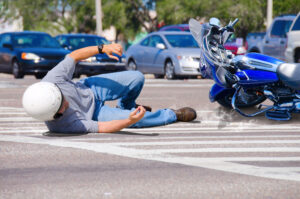Motorcycles equipped with crucial safety features contribute to accident prevention. Anti-lock braking systems (ABS) enhance stopping control, reducing the risk of skidding during sudden stops. Traction control systems also help to maintain stability, especially on slippery surfaces. Advanced lighting, such as LED headlights, increases visibility, enhancing the chances of being seen by other motorists.
Additionally, electronic stability control and smart braking technologies enhance overall motorcycle safety, providing riders with the tools necessary to navigate various road conditions and minimize the likelihood of accidents.
Despite these modern safety features on today’s motorcycles, serious accidents can occur when other people drive negligently and irresponsibly. If you sustained injuries in a recent motorcycle crash, a motorcycle accident lawyer in Phoenix can review your options with you and take the steps necessary to pursue fair compensation for your losses.
How do Other Drivers Cause Motorcycle Crashes, and Where Do They Frequently Occur?
Motorcycle crashes often result from other drivers failing to notice or properly share the road with motorcyclists. One common scenario unfolds when car drivers make left turns without adequately checking for approaching motorcycles. These left-turn collisions are particularly prevalent at traffic intersections, posing a significant risk to motorcyclists.

In heavy traffic, some drivers may become distracted, such as by texting or adjusting the radio in their vehicle, preventing them from recognizing motorcycles in the vicinity. These instances frequently lead to rear-end collisions, leaving motorcyclists vulnerable to severe injuries.
Tailgating, or following too closely, is another contributing factor to motorcycle accidents. When drivers tailgate, they limit the time they have to react to sudden changes in traffic conditions, making it challenging to avoid collisions with motorcycles. This often occurs on highways or congested roads, increasing the potential for accidents.
Furthermore, a lack of awareness about a motorcycle’s small size can lead to unsafe lane changes. Drivers may not adequately check their blind spots or use their mirrors to detect motorcyclists, resulting in side-swipe collisions. These incidents frequently take place on multi-lane roads and highways where sudden lane changes are common.
In some cases, drivers may misjudge the speed of an approaching motorcycle, especially when motorcycles are smaller and appear to be moving faster than they are. This misjudgment can result in drivers pulling out in front of motorcycles, causing a collision. Such accidents often occur at traffic intersections or when entering or exiting driveways.
Additionally, failure to yield the right-of-way is a recurrent issue in motorcycle accidents. Some drivers neglect to yield when merging onto a highway or turning at intersections, putting motorcyclists at risk of crashes. This lack of yielding often happens in areas with complex traffic patterns, making it crucial for drivers to use caution.
If you suffered injuries in a motorcycle crash due to another driver’s negligence, an experienced motorcycle accident attorney can examine your circumstances and pursue a claim with the at-fault driver’s insurance company on your behalf.
Injuries in Motorcycle Accidents
Motorcycle crashes resulting from another person’s negligence can lead to a range of mental and physical injuries for the rider. One of the most common physical injuries is road rash, occurring when a rider’s skin scrapes against the road surface during a crash. Road rash can vary in severity, from minor abrasions to more severe wounds that require extensive medical attention and treatment.
Head injuries are another important concern in motorcycle accidents – especially when riders strike the ground with a significant amount of force. These injuries can result in concussions, skull fractures, or traumatic brain injuries, with long-term consequences for cognitive function and overall well-being.
Bone fractures are also common in motorcycle crashes, particularly in the extremities like arms, legs, and hands. The force of a collision can lead to fractures or breaks, requiring medical intervention such as casting or surgery. Recovery from these injuries may also be long, affecting the individual’s ability to perform daily activities.

Spinal injuries are another serious consequence of motorcycle accidents, affecting the spinal cord and potentially causing paralysis. The force exerted during a crash can result in damage to the spine, leading to life-altering consequences for the injured rider.
The psychological toll of a motorcycle crash can also be profound. Post-traumatic stress disorder (PTSD) may develop, causing persistent anxiety, nightmares, and emotional distress related to the traumatic event. Depression and mood disorders are also common as individuals grapple with the physical and emotional aftermath of a motorcycle crash resulting from someone else’s negligence.
Soft tissue injuries, including sprains and strains, can also occur in motorcycle crashes. The abrupt impact or sudden changes in motion during a crash can strain muscles, ligaments, and tendons, causing pain and limiting mobility.
In addition to physical and mental injuries, riders may experience financial burdens due to medical expenses, rehabilitation costs, and lost income. These financial consequences further exacerbate the challenges that injured individuals may face post-accident.
To promote safety on the roads, it is crucial for all motorists to be aware of their surroundings, follow traffic rules, and prioritize the well-being of fellow road users – including motorcyclists. Taking preventive measures, such as wearing protective gear and adhering to speed limits, can significantly reduce the risk of motorcycle crashes and the associated injuries resulting from someone else’s negligence.
Filing a Timely Motorcycle Accident Claim
Filing a timely motorcycle accident claim with the at-fault party’s insurance company involves several key steps to ensure a smooth and effective process. First, it is essential to gather all relevant information about the accident. This includes obtaining the other driver’s contact details, insurance information, and witness statements. Documenting the scene, taking pictures of the vehicles involved, and noting the weather and roadway conditions contribute to building a comprehensive case.

Next, it is important to seek ongoing medical attention and maintain detailed records of all medical treatments and related expenses. This documentation serves as crucial evidence when filing the claim and demonstrates the full extent of your injuries.
An experienced motorcycle lawyer can then contact the at-fault driver’s insurance company for you. Your attorney can provide the insurance company with a detailed and clear account of the accident, highlighting the damages you sustained and the injuries you suffered. They will also clearly articulate the sequence of events and present any supporting evidence, such as photographs, witness statements, and medical records.
Throughout the claims process, your attorney can maintain open communication with the insurance company, respond promptly to any requests for additional information, and provide updates on your medical treatments and expenses. Cooperation and transparency can facilitate a more efficient resolution of your case.
As the claim progresses, the insurance company will evaluate your damages and injuries, aiming to reach a settlement. Your lawyer will review any proposed settlements carefully and, if necessary, negotiate with the insurance adjuster to ensure fair compensation for your medical expenses, property damage, and other losses incurred in the motorcycle accident.
By following these steps diligently and seeking appropriate legal guidance, motorcycle accident victims can significantly increase their chances of obtaining a fair and just resolution to their case.
Motorcycle Accident Litigation
Motorcycle accident litigation involves several stages, with the potential for a jury trial or alternative dispute resolution (ADR) proceeding. After filing a motorcycle accident lawsuit, the parties engage in a process known as discovery. During discovery, both sides exchange information and evidence related to the case. This includes gathering documents, interviewing witnesses, and deposing key individuals.
As the litigation progresses, attorneys for both parties may attempt to negotiate a settlement through ADR methods like mediation or arbitration. Mediation involves a neutral third party (the mediator) facilitating settlement discussions between the parties to reach a resolution that is mutually agreeable. Arbitration, on the other hand, involves presenting the case to a neutral arbitrator who makes a binding – and final – decision. These ADR options aim to resolve the disputed issues outside of a courtroom, potentially saving the parties significant resources and time.
If a settlement isn't reached through ADR – or if one party rejects the proposed settlement – the case proceeds to trial. Before the trial, the attorneys engage in pretrial motions, requesting the court to make certain legal rulings or decisions that may affect the outcome of the case. This phase helps to streamline the trial process and address any legal issues before presenting the case to a jury.

During a jury trial, both attorneys present their evidence, witnesses, and arguments to the jury. The plaintiff (in other words, the party who initiated the lawsuit) typically goes first, outlining the case and presenting evidence to support their claims. The defendant (the party being sued) then has the opportunity to present their defense. The jury assesses the evidence, listens to witness testimony, and ultimately decides the verdict based solely on the facts and evidence presented. Damages awarded at trial may include compensation for medical expenses, property damage, lost income, and pain and suffering.
It’s worth noting that not all motorcycle accident cases go to trial. In fact, many are resolved through settlements during various stages of the litigation process. Whether through negotiation, mediation, arbitration, or a trial, the goal of motorcycle accident litigation is to ensure that individuals who suffered harm due to another party’s negligence receive fair compensation for their losses and injuries. The legal process provides a framework for resolving disputes and delivering justice to those who suffered injuries in motorcycle crashes.
Recovering Compensation for Motorcycle-accident Injuries
The compensation that motorcycle accident victims may receive in a claim or lawsuit can be influenced by various factors. One crucial factor is the severity of the injuries sustained. More severe injuries often result in higher medical expenses, increased pain and suffering, and longer recovery times – all of which contribute to a higher potential monetary award.
Medical expenses are a primary aspect of compensation. This includes costs associated with emergency care, surgeries, hospital stays, rehabilitation, and ongoing medical treatments. Victims can seek compensation for both past and future medical expenses, ensuring that they are adequately covered for the full extent of their healthcare needs.
Lost income also plays an important role in compensation calculations. If the accident leads to time away from work, victims can pursue compensation for the income they would have earned during that period. Future earning capacity may also be considered if the injuries result in a long-term effect on the victim’s ability to work or earn at their previous capacity.
Property damage is another recoverable expense in a motorcycle accident claim. This includes the costs of replacing or repairing the damaged motorcycle, helmet, and any other personal belongings that incurred damage in the accident.
Pain and suffering, often referred to as “non-economic damages,” represent compensation for the emotional and physical distress that the accident caused. This subjective category considers the overall effects on the victim’s quality of life, taking into account factors such as depression, anxiety, pain, and loss of life enjoyment.
The availability and limits of insurance coverage can also influence compensation in a motorcycle accident case. If the at-fault party has limited insurance, it may affect the overall recoverable amount. In some cases, victims may need to explore other avenues for compensation, such as their own insurance policies or uninsured/underinsured motorist coverage.
Legal representation and advocacy can also influence the financial outcome of a motorcycle accident case. Experienced attorneys can navigate the complexities of the legal process, build a compelling case, and negotiate effectively on behalf of the victim to secure fair compensation.
Considering these factors collectively, the compensation that motorcycle accident victims may receive is determined by the unique aspects of each individual case. Seeking professional legal advice and representation is essential to ensure that victims receive the full and fair compensation they deserve for their losses and injuries.
Speak with a Motorcycle Accident Lawyer in Your Area Today

If you recently sustained injuries in a motorcycle crash, you need to speak with a knowledgeable motorcycle accident lawyer in your area as quickly as possible. Your lawyer can promptly investigate your accident circumstances and file a claim with the at-fault driver or other responsible party’s insurance company. Then, your lawyer can aggressively negotiate on your behalf or litigate your case through the state court system for a fair financial resolution.